Man: the Blazing Paradox
"Man...a paradox whereby two opposite passions may blaze beside each other. That is why our symbol is of the sword. At the heart a contradiction and a collision, extending its four arms out forever without altering its shape. The sword opens its arms to the four winds; it is a signpost to free travelers."
Man's declared Doom and Gift is Death. No other Doom is foretold for Men, either for the End of Days or for any Day prior, although there are specific individuals called to a Doom and a Fate.
Once, Men were greater. They were more heroic, stronger, and more loving. Today, it seems that only their capacity for evil has increased. And their lives are only half the length of that of their far forefathers. Though perhaps that is a blessing, as no one Human can cling to power for too long, and every shorter generation is a quicker rebirth and renewal. Gendûet sowed dark seeds and his evil roots have dug deep. While that god made Death something hated, the virtues of Death somewhat remained. Death, even perverted, keeps Humanity sane.
Vahan help us. We decline and do not know how to respond. We do not sorrow, like the Elves, nor do we hide, like the Dwarrow, but instead we idle and avert our attention from our lonely fate. Death's power should soon grow beyond us; our fears will overwash our hearts. We will be entangled in the veil even as we go beyond it.
Nature of Men
A Human is a mortal being with a limited lifespan who is not bound to this world. A Man's soul is destined to leave the mundane sphere to a realm where even the gods know not, for the gods are the Powers of the World.
This means that Men are creatures capable of breaking the frameworks to which even the gods are bound. Humans are capable of great feats of seemingly impossible skill, bravery, and love. As such, while the Elves have always been hated by Gendûet, he has feared Men the most above all the other races. So Gendûet set his face against Men, and Gendûet's worst curses and deceits have been directed towards them. Men suffer the god's evil; it has sunk into their very bones. But Detheril the Mariner proved Gendûet's fears to be warranted. Detheril beseeched the Gods of Heaven and they came in lightning and fire. Gendûet was overthrown and is bound in the Gates of Night.
When a Man dies, they do not return to this sphere. Magic can bring a person back to life by reviving the bodily functions, but old age prevents even Magic from working.
The Locus of Control in Humans
There are two realms that make up our world. Without both you do not have the world, but a shadow of it: a privation. These realms are called the Seen and the Unseen. Much of Man's nature can be sourced from their relation to these two realms.A Human is a mortal being with a limited lifespan who is not bound to this world. This is because Humans are only incarnate in one realm: the Seen. A Human body, being incarnate only in the Seen realm, does not have the eternality afforded to creatures like the Elves. An Elf is incarnate in the Unseen realm and the Seen realm. There is a further explanation of what being from two realms does to Elven-hood in the article on Elves. This article section's emphasis is on the difference between Human nature and that of the other races.
So, a Human has a different sort of matter than all other races because of their place of incarnation, that being the Seen realm. The Human matter is privated in terms of this world of matter, which both includes the Unseen and Seen realms; though it is not privated in terms of its accordance to the will of God. Because the Soul, also called the Mind, is the further Form of the Matter, which is also called the Body, so then a Human Soul is a different sort than other species, which are not privated like a Human's. The Human Matter is different, thusly the Form is different. It is this difference from where we can find the short lifespan of Men. Humans are not meant to reside in this world. We reside only in half of it. And we are of the Seen realm, which is meant to pass away. So we are only temporary beings. We are meant for further places, though we cannot say more than that.
This, then, can help us understand the unique human ability to, with Reason, infer conclusions from causes. Or, more correctly, this will help us understand the uniquely human method of inference. Because Human nature is separate from the Elves and Dwarrow mentally, physically, and spiritually, their reasoning abilities are different. This is what causes the seeming ability for Humans to break the Chain of Fate for Elves and Dwarfs. This is what causes the seeming ability for Elves and Dwarfs to break causality for Humans.
In its general sense, therefore, reason may be attributed to Vahan, and an angel may be called rational. But in its narrower meaning reason is man's differentia, at once his necessity and his privilege; that by which he is "a little less than the angels", and that by which he excels the brutes.
The Human nature of reason and their privated material and formal nature means that Humans are less experientially there compared to the other races. We must always process things through cerebral assertions and cerebral synthetic activities. Now, Humans do not necessarily use inference for everything, but the power of Reason includes the Human ability to synthesise phenomenal experience with a priori categories. So the point stands. Humans do not always rely on inference in their judgements, but Human Reason is always applied.
You might be imagining that Elves and Dwarrow are like animals, then. They do not have the power of Reason. But this point cannot be stressed further: Humans are only capable of Human Reason and Inference. If the Elves and Dwarrow did not have the power of their own Reason, then they could not teach us anything; they would be like animals, then. But this is categorically false. An Elf and Dwarf have a different kind of Reason from Humans, but we do not know if it is the inferential kind; we only know that the Elvish and Dwarrow Reason are purely noumenon—their Reasoning is equivalent to the inaccessible reality, as if the world were experiencing itself with no veil. It is an absolute and objective Reasoning. But Elves and Dwarrow can still be incorrect about matters due to corruption of their being.
Any scholar can tell you of the strange experience it is learning under an Elf, a Gnome, or a Dwarf. Communication about intensive matters is an experience almost like speaking past another; your words turn greased and slide past each other. But when they split ways, they find that they understood everything perfectly, not in their terms, words, or even reason, but rather at the heart; it was understood not intellectually or even intuitively, and any actions derived from the speech are dreamlike and hardly understood by even their actors. It was as if a cloud had descended over their eyes and mind and had led and advised them towards actions mysterious and shadowed. This strange experience is explained that, as one asks more difficult questions, one begins to approach infinitely closer to the point of requiring the mind to have infinite and intuitive knowledge—that is, one grows closer to requiring pure spirit. And Elvish spirits are different from Humans. They cannot communicate face to face. And this can be applied to all high concepts—even mathematics.
And yet, not every member of the other races has this effect; many times we are just left confused. Simply stated, some are better teachers than others. But we cannot say how this works. We never understood their explanation in the first place, yet for some we come away understanding, and for others we go away confused.
And if this difference in their natures and Reasons is most obvious in high and heady matters, it is nearly impossible to register in mundane matters. Chattering about market prices with a Dwarf is as normal as anything else. Chattering about why the economy has caused these prices, less so. Chattering about the metaphysics that requires us to desire prices—the least of all. This is the fundamental difference between the races. Their natures differ in their locus of control—Humans totally in the Seen realm, the other races in the Seen and Unseen—and this created different minds and bodies. The body is different in Humans by its perishability—for we were born of mist and fire—and the mind is different with its intelligibility between the races—so that all minds are perfectly reasonable but have different points of emphasis. And so in more mundane matters—those things with less input from reasoning—this means that the different races may talk more closely and speak face to face.
The same is true of the body. Men, being residents of only the Seen realm, have a limited lifespan and are physically weaker than the other races. Men also undergo eras of 'fashionability'. Body types, paintings, discoveries: all these go through eras of fashionability, stemming from their flighty nature not entirely bound to this world. Their appetites are not big enough for everything; we are too quick to be excited by sameness as the Elves and the Dwarrow are.
The Razor's Edge
Men must balance on a 'razor's edge' to maintain a healthy and moral lifestyle. This is unique to Men. When Man deals with Man, there must be a careful management of what actions and words are said, according to the moment, to achieve the according and desired results and to maintain the moral status quo. In battle, a Man must be willing to kill and to be violent, but in the court and hall, he must be meek and gentle. A Man must be both strong and weak, and these traits will blaze against each other, and they will only blaze while against each other. Otherwise, they will smother and die. A Man may build walls, but he cannot build only walls. They are to be sallied from, as well.
If a Human were to need a kind word, then his fellow must give that word. An Elf might overwhelm and terrify, but, while such a thing is improper for a Human to do and is only harmful, that Elf may have accomplished more with his terror than a Man may have done with his according kindness. An Elf may even do the opposite, to build up and comfort in such a way that, if a Man were to try, it would only cause self-conceit in the target. But both, while in dis-accordance with the 'razor's edge' of Man, will, because they are done by an Elf, still be boons. The same goes for a Dwarf. While Men must act within the boundary of 'accordance', the other races have no qualms with acting strangely, though still helpfully. While the other races will still strive to achieve the virtues like Kindness, Goodness, or Gentleness, their method of striving will be alien to us. It is only Men that must do the right thing, or the correct, or the logical, to achieve the right results.
Unbinding the Creator and Created
The constructions of the Elves and Dwarrow take after their creators and express strange natures. If their cities were removed of their makers, then these places would become lesser, and no other race could maintain their beauty, and the very stones would remember them.
Not so with Humanity. A city may be emptied and Men from other continents may be brought over, but the city may be restored to new life. Life will fill the streets again and the memory of its loss is not carried on.
The city will be different, surely, but the very stones will not cry out for their previous builders and masters, as with the Elvish ruins. The old works of Men may be beautiful beyond reckoning, but they will always be beautiful so long as Men are there to take care of them—regardless of the caretaker's origin or personality.
Man's deeds are not bound to the race and the people, but are tied to the deeds themselves. Their lack of attachment to the Unseen renders their constructions as objects under their constructor's gaze, and only darkly mirror, rather than take full part in, their creators.
Men live in a cosmos in which its denizens are, by the majority, irrational and strange. But Man can work with these beings, and learn from them. And if Men are in the minority, then it seems that they are the strange and the insane. Euilez has been called the patron god of Men. Many have to drink deeply from Euilez's cup to understand Humanity.
The Coming of Men
Born from heat and cold. Our lives follow the beginning, as the arrow follows the force of the bow string.
Lerluft rides his steed Hiffne across the blue sky in the long cycle, and they are resplendent and beautiful together. Now, Vahan took a long hair of Hiffne's fiery mane, and cast it upon the snowy fields of Baantar. At the striking of the long fiery hair against the chilled snow, there was a great hiss of steam, and from that steam rose Men, the Second-born; and Vahan exhaled into them the Breath of Life; and to Man was given the Gift of Death, though in the rejection of the gift many woes have been caused. Their arising was from struggle; so it has been, and Man will ever be the Creature of Paradox and Delight.
But Gendûet was also quick to act, and he ensnared many Men before the gods could assist them. These Men were either taken as slaves, or worse, were subject to the experiments of Marqôd. There was a massive exodus to the West, and the Men who fled spoke of a dark presence to the East.
Summer Age of the Elves
Many Humans fled from the East and Gendûet's long arm. It is said that the First Men to arrive in the West rode on tall, mighty horses with manes of froth from the roiled sea. While some Men stayed in the East, most fled westward and met the Itie'lman Elves flowering in their Summer Age. As Humanity disseminated across Aran and Erub, they established kingdoms under the patronage and care of the local, ruling Elves.
This blessed time was short-lived. Even in the eyes of Men these times of peace were gone too fast. But it was enough time for Humanity to settle in most regions of the world. And there were many mighty Houses and kingdoms established.
The House of Bel was founded in what is today Lower Huraedon, under the care of the Eresdolhn. The House of Al-Afir was founded as a vassal of the Clan of Muyyaqar in modern-day Alk'kir. And the House of Tuakin was a mighty kingdom of mountain men living in the Peku chain, under the care of Clan Bodo, of the Pirisqwik Elves.
But this was still the Age of the Elves. There was not yet much to be done by Men, though their time would come.
The Wars of Hate
"The leaves were long, the grass was green,
The hemlock-umbels tall and fair,
And in the glade a light was seen
Of stars in shadow shimmering."
In an age of terrors beyond terror, the strong arms of Men were needed to keep the Yeqitari from overwhelming the West. In these times Men, for a while thought to be merely inferior Elves, only fit to be vassals, came to the forefront of the world-stage as mighty commanders and fighters: cunning, tenacious, and numerous, each individual filled with a quality of heroism that dazzled like diamonds under the stresses of battle. Many curses were devoted to the northern Corodwalt tribes, led by Calmacil the Lion of the North, and some of the Eastern Elves thought to themselves that this strange, short-lived species that harried them were constructs summoned from the Plane of Fire, put in perishable bodies, their spirits burning so fiercely as to destroy their forms over the years.
Of course, the Yeqitari had Men of their own, although much lesser in number. They were sent to the forefronts of battle meant as decoys or to bear the brunt of the first, initial charges. They didn't look Human, abused and malnourished as they were—many thought, including the Yeqitari, that they were a new breed of Dwarf. The Men of the East were pitied, and many of these poor souls were taken by the Corodwalt and joined with their tribe.
Losing the Wars of Hate
But the Wars of Hate lasted for many years, and the initial surprise from the ferocity of Men ended. The Yeqitari began to advance. Gendûet turned his eyes upon Humanity, and began to instil evil spirits into many of their hearts. He played on their fickleness and fallibility. Greed and Pride were leaned on. Soon the razor's edge had fallen sideways, and Man had been guillotined. Their mighty deeds began to end and brother turned on brother. The Itie'lman had to look inwards towards their feuding vassals as well as outwards, towards the approaching armies. The free peoples were soon defeated.
But then Detheril the Mariner ascended into Heaven with the Sword of Mathiel, brought there by Lur Seat of the Sea. Detheril brought pride to his race. He beseeched the gods. And so the gods descended, and they ended the Wars of Hate in a flash of fury and fire. With its ending the Age of the Elves had ended and the Age of Man began.
Ascendancy of Man
As the Elves diminished in power and presence, Man became the dominant race in the West. Many Elves chose to go with the gods and Fionn eä Vanwi to face due justice for their deeds. This left Humanity and the Dwarrow to reign in Erub and Aran.So, while we say that the Age of Man directly proceeded the Age of the Elves, there was a long intermediate period as the elder races mingled in their final decay. The middle ages are marked by the rise and fall of the Black King Elwëdorf, his many successor states that followed his fall, and the relative dominance of the Dwarrow over many regions of the world. This period was a chaotic one, and many wars happened in this time. Disease was rampant, and for a while it seemed that the leaving of the Elves meant the death of the world.
The Age of Man truly began with the rise of the Empire of Nelqora. Even after its fall, Humanity remained the most powerful race in the West—although divided between many feuding kingdoms. The Black King successor states had been wiped out by the time of Nelqora's fall. The Dwarrow Kingdoms began to isolate themselves in this time period but still had much influence over the realms of Men after the Sundering of Nelqora.
And beyond those years is Humanity's modern history. The rise and fall of kingdoms, the issuing of new ideas, the rejuvenation of old glories: Man is at the forefront of all these things. They fail and falter often, but they move forward. And the capstone of their efforts are the Empires of Juraedon and Kilae.
On the Men of Tizüb
- Tumen Jurgen
- Baiyurts
- Pashjik
- Horxmen
The Men of Tizüb have always been the least numerous of all the peoples of Men. But after the Wars of Hate they have grown in numbers and power. They now rule large portions of the eastern continent, and the local Elves can't push them out.
There are four great groups of the Men of Tizüb. The first among them are the Tumen Jurgen, a race of short, sallow-skinned, narrow-eyed men who ride horses across the plains of Baantar. They have made themselves great enemies of the Yan.The Baiyurts are pale and tall, but many have narrow eyes like the Tumen Jurgen. Many Wizards think that these men had mixed with the Corodwalt tribes in times long passed. They ride fierce horses across the northern plains of Uulsan Torall.
The Pashjik—also called the mountain men—live in the dry hills of Uulsan Torall. They are short and stocky but muscular. They have pale skin and are a brave people.
The Horxmen are a poor and unpopulous people that live in the country of the Altaic Elves. They live on ice floats. They are tall but muscular, and they have narrow but colorful eyes. There are few peoples who are more hospitable.
These groups are divided into hundreds of feuding tribes. But if any of them were to unite under a single leader, they should become a deadly force. The Emperor Aelmourne had united the Baiyurts and the Pashjik in his younger years. Today, the Empire of Juraedon is slowly integrating these wildmen into civilised society.
On the Men of the North
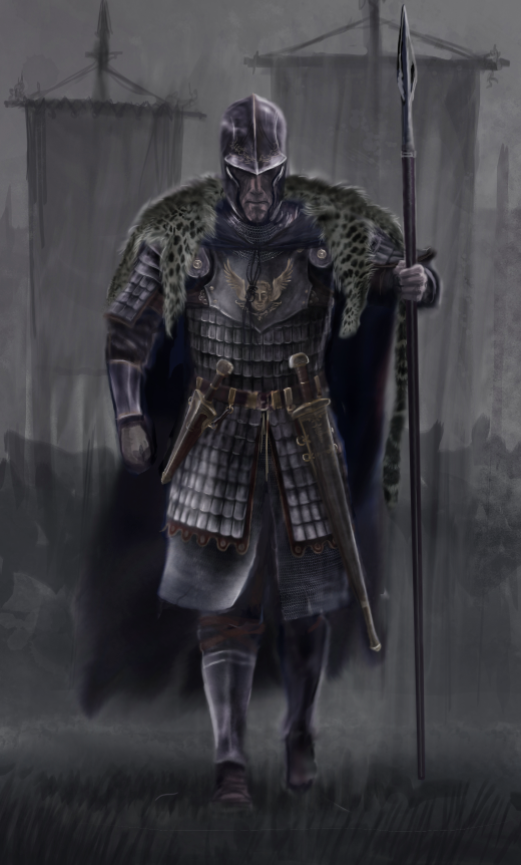
The Men of the North are the peoples who live in the northern reaches of Erub. The majority are also Men who claim descendance from the Nelqorana, the High Men of the North. Within the Northmen, there is an informal hierarchy of status of blood. Those most related to the Nelqorana are viewed more highly. The races go as such:
The Nelqorana, an extinct people but worth mentioning due to their vast impact on historical affairs. They are the High Men of the North and were once the pinnacle of all Humanity could offer. They were great, but their impiety destroyed them.
The Tetians are a race of tall, fair-skinned, slender people with colorful eyes who reside on the Island of Tete. They live in a land of greenery and feuding clans with a single, mostly nominal, High King. They are notable for their unique connexion to the earth and the Elves.
The Pol-Nelqorana are a varied group of peoples who live in the northern regions of Juraedon Proper. From the Iru-anc Terrain to the Coastal Ovtrelands to the Mountains of Das EkLachen you will find them. They are a tall race with fair skin and fair hair. They are a strong people used to a hard life; they are adept sailors and warriors.
The Juraedonites are those peoples most closely related to the Nelqorana of old. They live in the northern flatlands of Juraedon Proper and have the appearance of a Pol-Nelqorana, although they will sometimes have black hair.
None of these peoples have the full strengths and powers of the Nelqorana, but they carry on their legacy.
On the Men of Erub
Men of Erub Listed
By far the most numerous of all the peoples of Men, the Men of Erub represent a vast group who are as different from each other as a Pol-Muyyaqar is different from a Yan Elf. But these Men still share a culture and history by nature of sharing the same mass of land. Only the Southern Men of the Southern Marches of the Empire of Juraedon are not mentioned here, though they occupy a large portion of the continent of Erub. This is because they are more correctly placed as Men of the southern continent of Aran; their culture is more related to the Men of the south than to the Men of the north, having been separated from the northern lands because of the Great Western Range.
There are three main divisions, which are organized more geographically than culturally. Each division contains a large number of competing peoples who differ from each other in varied ways. The numbers of Men are great, perhaps reaching the numbers of the Elves in their Summer Age, so it is no surprise that Men have a great number of cultures and views.
The first group is the Men of Greater Huraedon. They are a numerous and wealthy people. Ranging from olive to fair-skinned, their people are of a modest height. For most of Human history, Greater Huraedon has been the crossroads of culture. Its people are proud and strong though they are, in general, well off, and so not particularly as hardy as their northern fellows.
Then, are the Men of Lower Huraedon. They are a shorter and hairier people and often of darker coloration. There has been much migration between the Greater and Lesser regions of Huraedon, though, so many of Lower Huraedon's residents have paler skin and fairer hair. While the Men of Lower Huraedon haven't, in general, enjoyed the great wealth that most in Greater Huraedon experience, those of the eastern regions, especially those along the coast, have long enjoyed prosperity. And even those more inland are able to live modestly by trading in their mineral riches.
Lastly, are the Men of Alk'kir. They are a dark-skinned people who live in the region of Alk'kir, west of Greater Huraedon and bounded to the south by the Western Mountains. They are a hardy people who have grown up in the shadow of the desert.
On the Men of Aran
- The Southerly Men
- Men of Acoma
- Men of Aran Proper
- The Peku-Enkra Men
- Men of Xakapu
The Men of Aran populate the southern continent of Aran. This collection of peoples includes the Southern Men of Erub. Now, because of the difficult terrain of Aran, the Men of these regions can be more clearly divided and categorized by culture. Nevertheless, these categories have many major internal divisions, and each is so large that they are stereotypes, at best.
First, are the Southerly Men. They live in the Southern Marches of the Empire of Juraedon. They are a stocky and dark-skinned race of men. They, like the Tetians, have a deep connexion with the earth itself. Their native religions have an animalistic and naturistic bent. Compared to most divisions of Men, they've had little contact with Elves throughout their history.
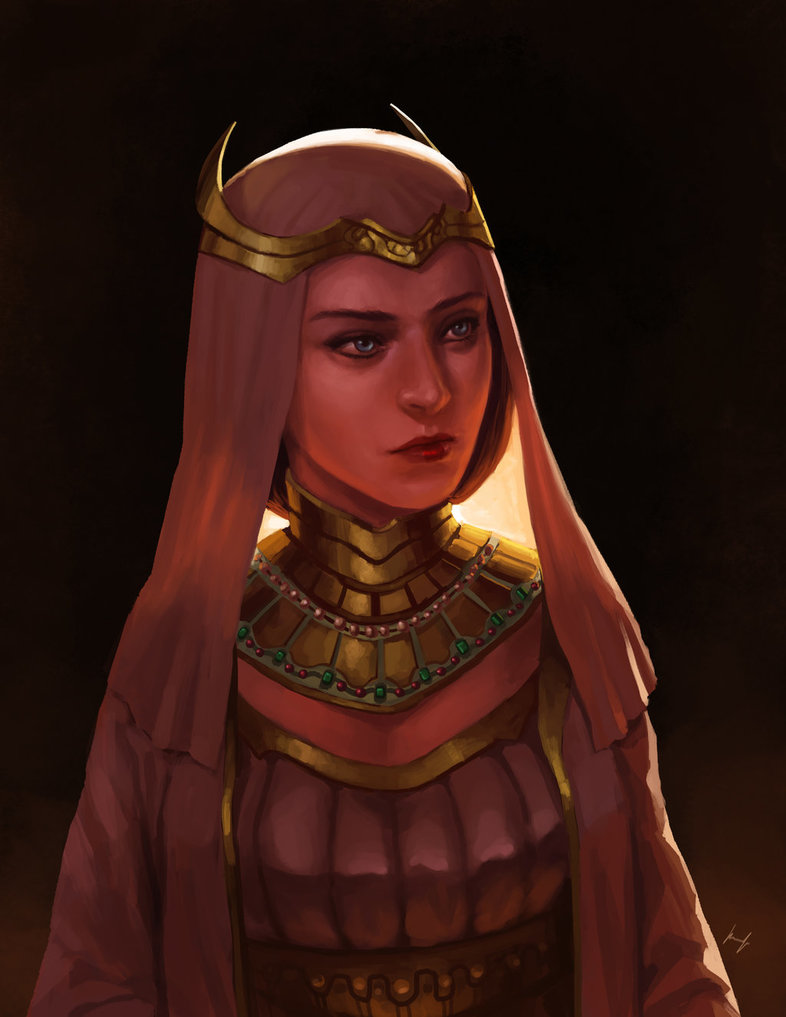
Then, are the Men of Acoma. They are the Men that live in the northern reaches of the Empire of Kilae. They are a dark-skinned people with oblique, wide eyes. They are tall and willowy and speak softly. They are the wealthiest people in the Empire of Kilae.
The Men of Aran Proper are those who occupy the flat and fertile coastline that stretches from Ayara Uchu to the Wieldard Savanna. They are a dark-skinned people with narrow eyes. They are a somewhat short and hairy people with broad heads. The Men of Aran Proper have had a culture and history of seafaring and war. Though, in regards to their culture of war, they do not do so much battling today. They are also a deeply religious people and are wont to building large stone temples.
The Peku-Enkra men are those hardy and ingenious people who live in the mountainous regions of Kilae to the west and to the south. For much of history, they built mighty empires in the most inhospitable of environments. Their unity and kindness to each other are not to be understated. Their ferocity in battle, especially in defense of their homes, is admirable. They are a short, barrel-chested people with narrow eyes. Their skin can be dark or fair.
The Men of Xakapu are men who live in the vast jungle environments of Kilae. While they are not a unified people and are a diverse set, they are categorized as Men of Xakapu simply because they live in the jungle. They are short, hairy, and dark-skinned. Many of their eyes are of an exotic color, shining either silver or gold. They are a superstitious and violent people who have not been brought fully under the control of the Empire of Kilae.
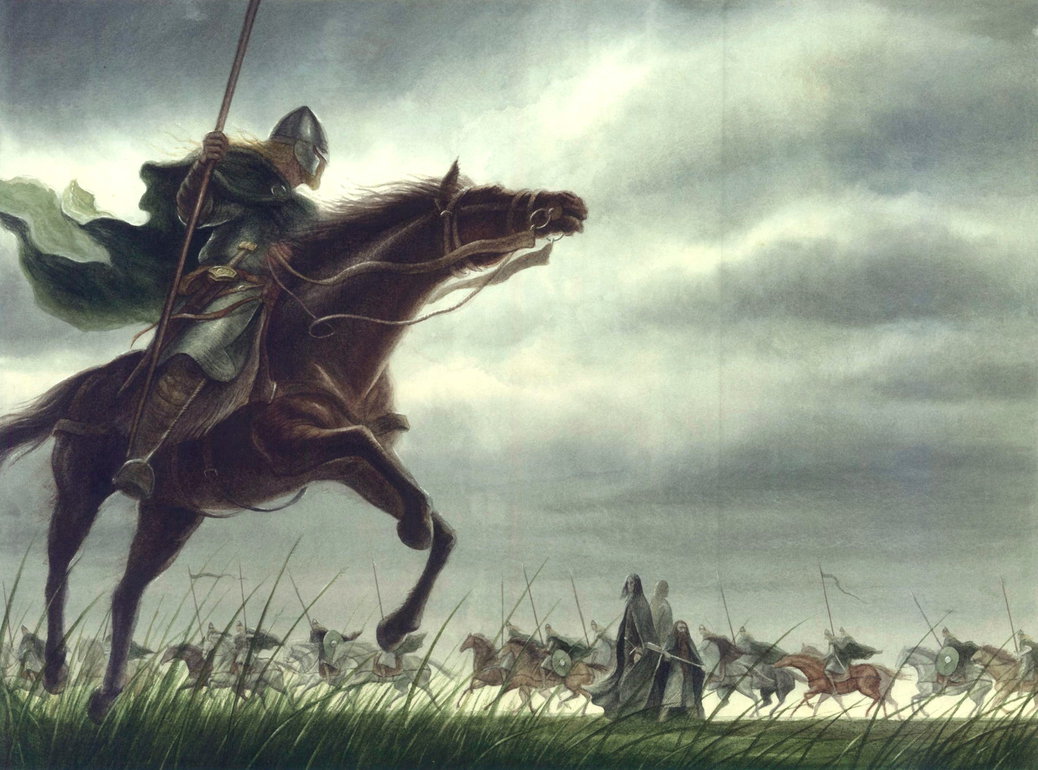
Life beget of Fire and Water
They trample the ground
It is like the thunder
Men of the North
Men of Erub
Men of Aran
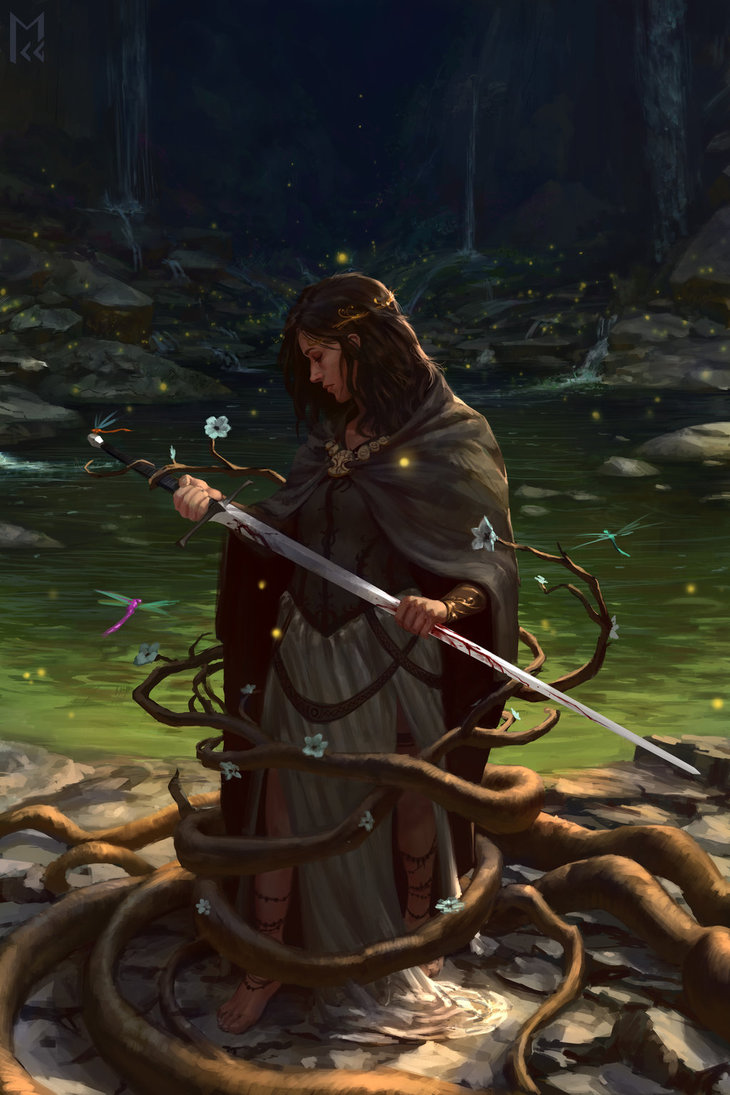
Men are capable of communing and loving nature nearly as well as the Elves may. At the very least, it's possible for Men to love nature perfectly according to their design. Just as we don't say Elves aren't ambitious, and that Dwarfs do not know generosity, so we ought not to claim that Men are incapable of higher feelings, and that Men are driven by purely animal instincts for wealth...we are spirits as well as bodies.
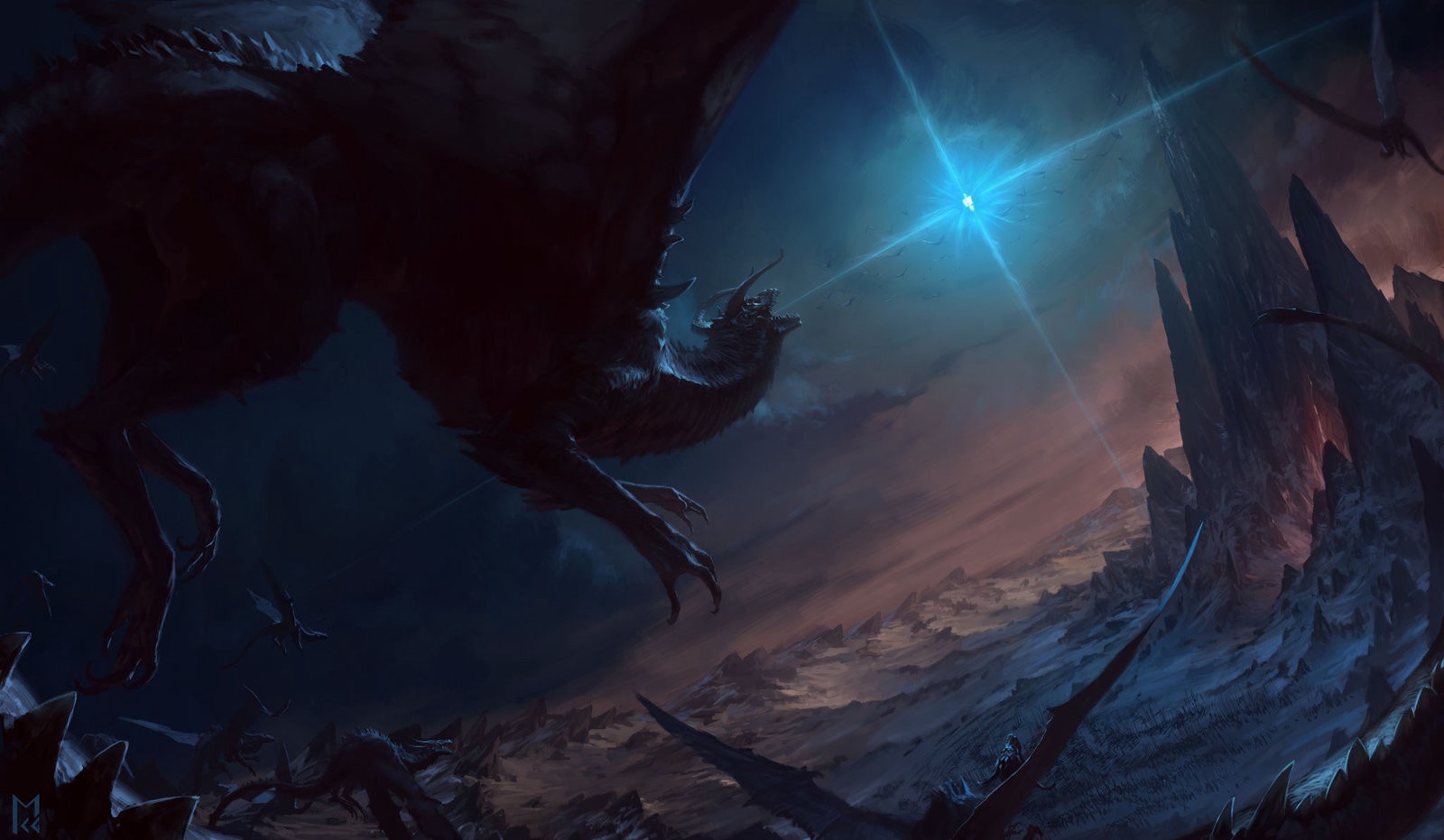

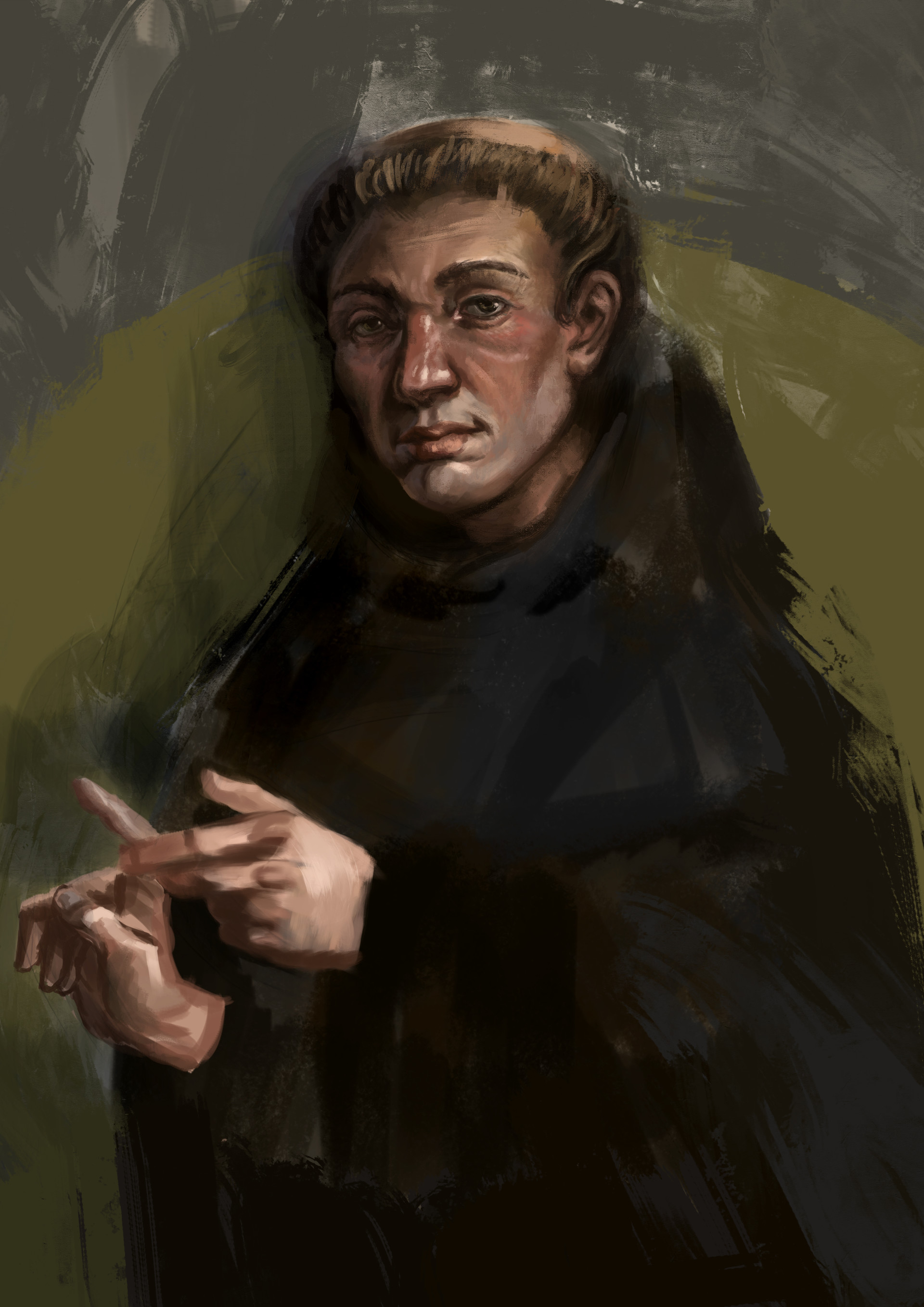

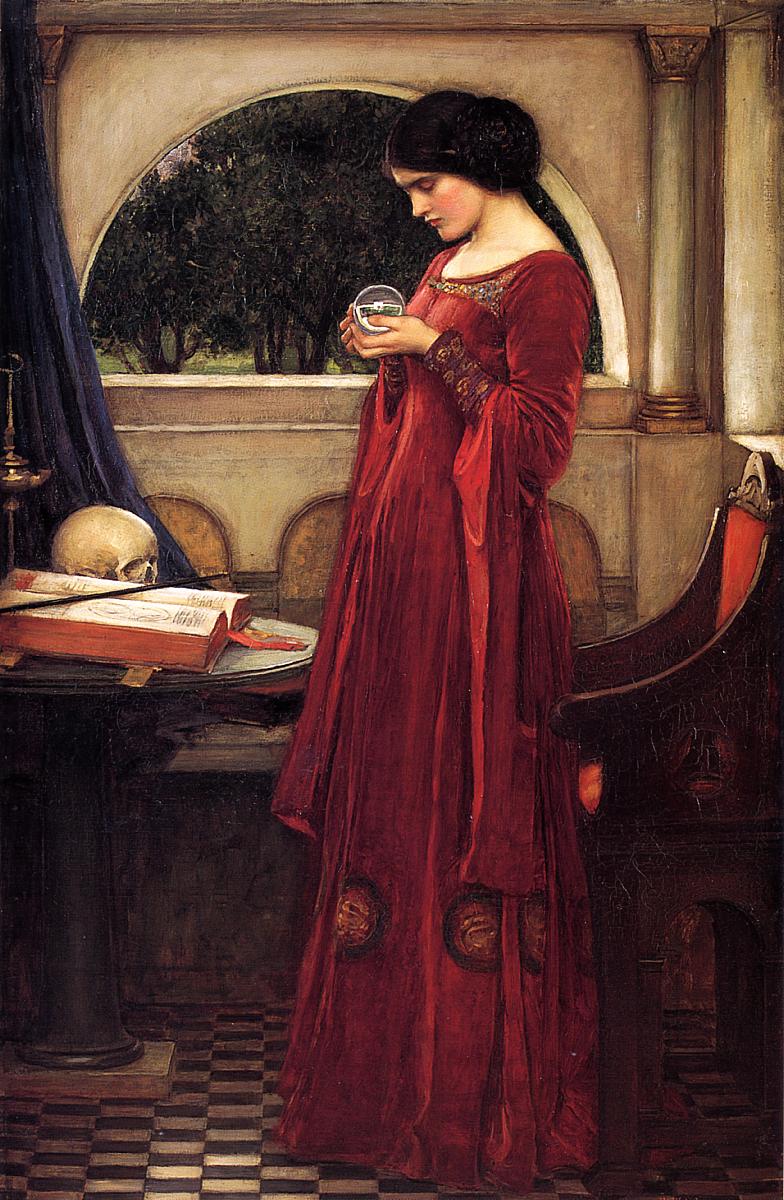
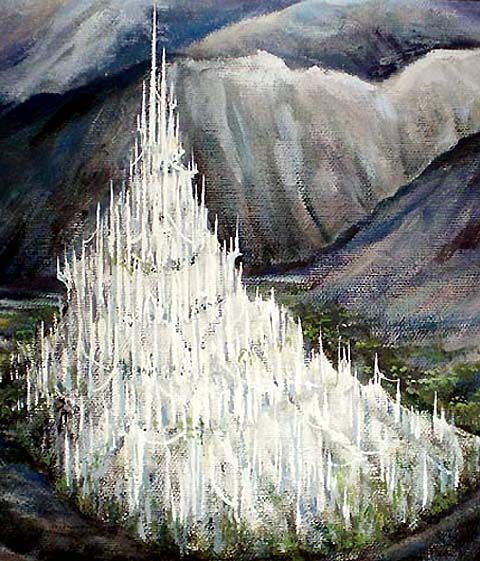
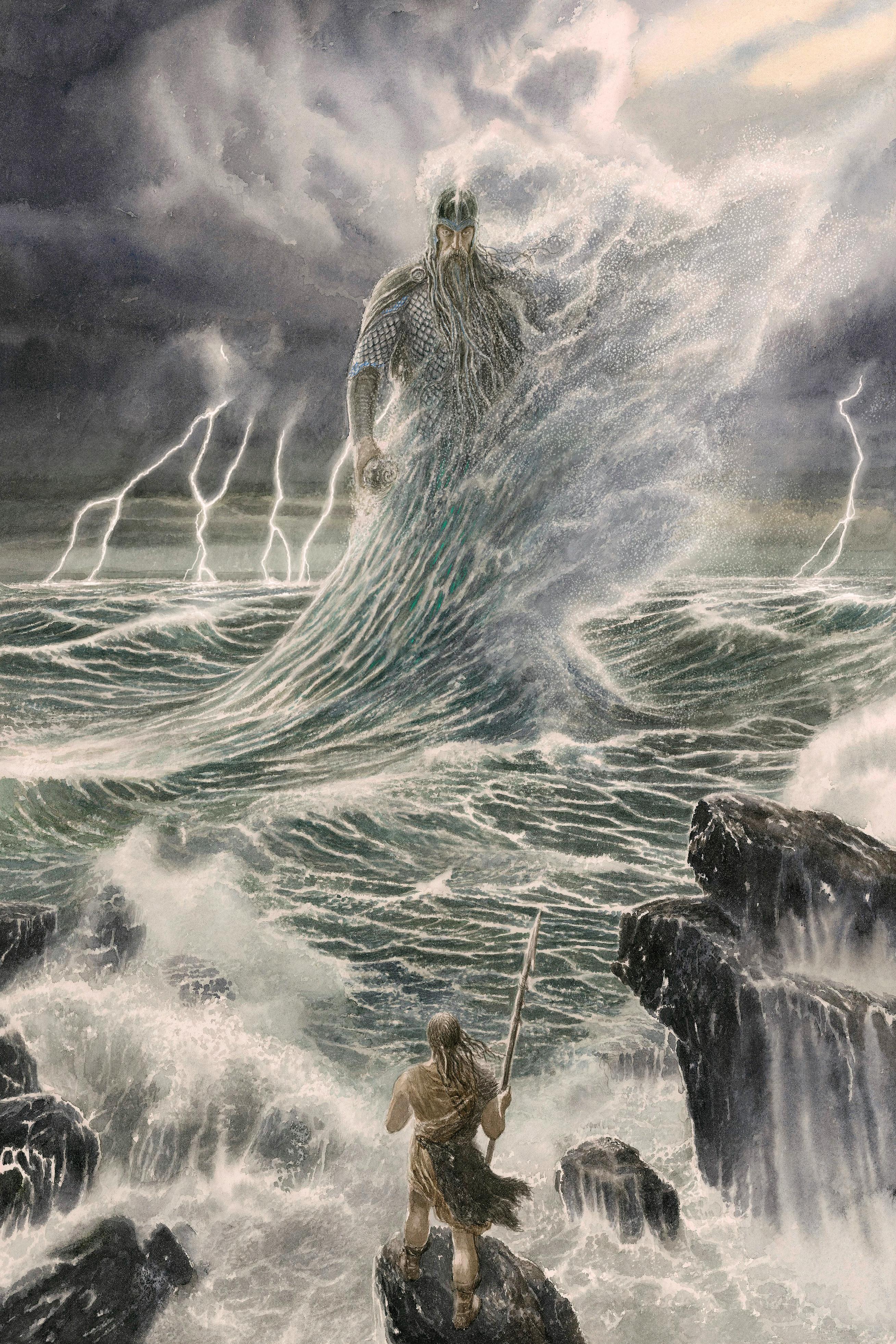
very detailed article, but for someone like me who is too lazy to fully read all the way through, have you considered putting a tl;dr at the top?